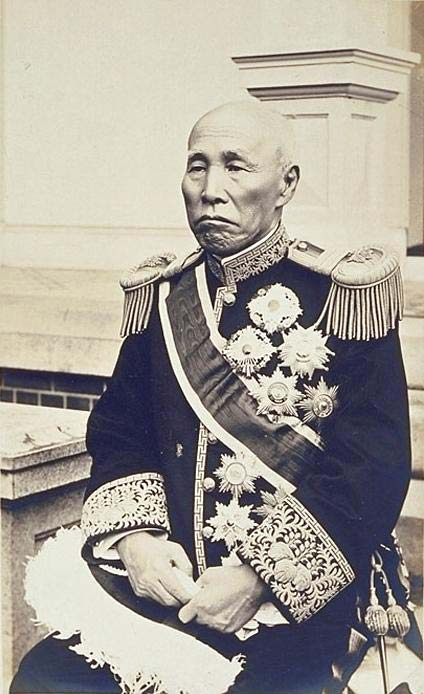Ōkuma Shigenobu (1838-1922) was a Japanese politician, credited as being one of the major forces behind the introduction of modern democratic government to Japan. He was the prime minister of his country twice, the first time in 1898 and then again between 1914 and 1916. Ōkuma was the founder of Waseda University, and he set up the Progressive Party, or Rikken Kaishintō. For the last few years of his life, after having retired from an active role in politics, he held the rank of marquess.
Early Life
Ōkuma was born in the city of Saga, in southwestern Japan, on March 11, 1838. He was educated fairly conventionally for a man of his status and time, but he then quickly became interested in Western culture. He learned to speak English, which at that time was still considered unusual in Japan. In 1868, the Meiji Restoration had restated that the emperor had full, formal authority to rule. Leaders of the new government wished to broaden their support base. They did this by including representatives from the Saga area where Ōkuma had been living.
Ōkuma had already become known for his capability and his courage in taking important decisions, and this helped to bring him a significant role in the new government. At first, he briefly held a role in the government’s financial administration, but in 1869, he was placed at the center of Japan’s modernization program. In this role, Ōkuma’s main responsibility was to overhaul the outdated fiscal system of the Japanese Empire and to bring it in line with modern practice. Ōkuma remained in this job for twelve years, until 1881.
Radical Political Views
The government was keen to draw up a new constitution for Japan, and Ōkuma was one of the government ministers who was asked for his views on how it should be written. He startled his fellow ministers by suggesting that a thoroughly Western democratic system should be established: the very next year, full elections should be held for places in a new parliament modeled on the Westminster system used in the United Kingdom. Ōkuma also proposed that British practice should be followed in making the cabinet answerable to the new parliament.
Shortly after this consultation, Ōkuma became embroiled in a controversy that was to end with his enforced departure from the government. The government had proposed selling a certain amount of its property on the island of Hokkaido, the most northerly of the four large islands in the Japanese archipelago. Ōkuma showed that the proposed deals were riddled with corruption, after which his political enemies made a concerted – and eventually successful – attempt to make him leave the Japanese government entirely.
Nevertheless, Ōkuma remained a highly popular figure in the country at large, and his support for a formal constitution for the country was widely backed by Japanese citizens. At length, the Emperor Meiji was forced to bow to the popular will, promising that there would be a constitution in existence by 1890. This promise was kept, with the new constitution being promulgated on February 1, 1889. Once this had been done, Ōkuma set up the Kaishintō political party, which followed his own feelings in that it was slanted toward concepts of parliamentary government as it was practiced in Britain.
Rejoining the Government
In 1888, Ōkuma had agreed to rejoin the government, and on two occasions he served his country as foreign minister. Ten years later, he held discussions with Itagaki Taisuke, who had set up the Jiyūtō or Liberal Party, the first modern political party to exist in Japan. The outcome of these talks was that the two men agreed to set up a joint organization known as the Constitutional Party, or Kenseitō. Later in 1898, this was able to form the government and Ōkuma became prime minister. However, the new government was dogged by matters relating to patronage, and it failed before the end of the year.
In 1907, Ōkuma decided to retire completely from politics and spend his time on the upkeep of Waseda University, which he had founded in 1882. However, in 1914, he was to re-enter the national government as its prime minister. Japan prospered economically during the two years of his term, partly thanks to the increased demand brought about by the outbreak of World War One. Ōkuma’s most significant political action during his term was the issuing of the 21 Demands to China, an act which badly damaged relations between the two nations. Ōkuma retired in 1916 because of poor health.

